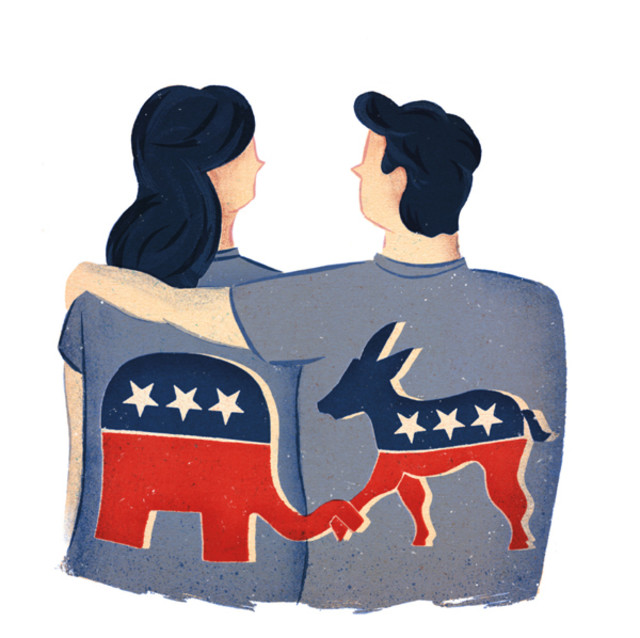The Partisanship Cure

Image: Adam Hancher
In our 20-year partnership my husband and I have gotten a couple of big-ticket things right, including this: We found a great couples’ therapist, then put her on speed dial. We found her before we got married, to help us figure out why we were so scared to get married. Periodically we’d pop in for tune-ups, concluding that marriage therapists should give out stickers a la Jiffy Lube to affix to the bathroom mirror: Come back in four years or 4,000 fights, whichever comes first.
We are as happy as any couple I know—and we’ll still be having the same arguments in our nursing home. They’re as intimate a part of our union as the blanket we pull over ourselves at night; a function of being two independent individuals with two distinct souls. Differences are part of every union. The key, our therapist taught us, is not not having them, because…good luck with that. The key is having them right.
So we’d argue in her office while she’d referee. “Time for a paraphrase,” she’d break in, interrupting my fabulous interruption of my husband and the fabulous point I was just on the verge of changing his mind with. “Now’s not the time to make your point,” she’d remind me. “Restate what you just heard him say so that you’re sure you understand it.” Understand it? What kind of advice was that? No no, the idea was to win him over to my way of thinking, not understand his stupid opinion.
That, I learned, is no way to conduct a marriage.
Now that we’ve endured the dispiriting brawl known as the presidential campaign, and the protracted impasse known as the new Congressional normal—I see that it’s also no way to conduct a democracy. The problem is not the differences between the parties. The problem comes when one side misleadingly summarizes the other’s argument. Or makes knee-jerk assumptions about the other guy’s base motives. The problem comes when both parties refuse to wrap their heads around the deepest held convictions of the other.
How I would love to get our marriage counselor on the Senate floor with Mitch McConnell and Harry Reid. Better yet: on cable news with their spin doctors. Heck: around the Thanksgiving table with my family! She’d have the liberal asking the conservative what it’s like for him when he feels the freedoms he prizes are being threatened. She’d get the conservative paraphrasing the liberal’s belief that simple humanity demands we share the care for the weakest among us. No interrupting, no accusing—our counselor would enforce the rules necessary for that rare outcome higher even than winning: comprehending each other.
Marriage counselors know that when that understanding is missing, contempt flourishes: anger juiced with the belief that the other is inferior. Dr. John Gottman, the Seattle marriage counseling guru, says contempt is so toxic it’s the most reliable predictor of divorce. In the political sphere, contempt compels us to fixate on a rival’s idiotic sound bite instead of the substance of his message. Egged on by our Greek chorus of Rachel Maddow and Bill O’Reilly, we ascribe only the most cynical motives to the other guy. The American electorate, of course, has been so deeply corroded by political contempt we have forgotten that it’s possible to disagree with a political rival without delegitimizing him.
Our marriages and our families allow us to practice remembering. Indeed, there may be no more essential instrument of democracy than the Thanksgiving table. For many of us, that’s the only place we engage with people we both love and differ with politically. For me it’s my right-wing “Uncle D.” My genuine love for him is the only thing keeping me from writing off all Tea Partiers as raving wing nuts. He’s not a wing nut. He’s a complicated guy with a reverence for freedom that differs not so much from my reverence for civil liberties.
Agree with him? Probably not in this lifetime. Understand the values at the root of his politics? Better every November.
The best definition for marriage I’ve heard is this: the relationship in which you bear the other’s deepest desires as tenderly as you bear your own. Not share them, necessarily; just bear them. It invites an intriguing vision. Who would Democrats be if they worried over restrictions on free enterprise? Who would Republicans be if they had to solve the problem of the uninsured sick? Who would we all be if compelled to consider our opponents’ priorities alongside our own?
Democrats and Republicans may not be in love, but we are committed. Democracy functions best when we have an other to sharpen our ideas against, and enough variety of opinion to engage a range of citizens. This is what marriage counselors mean when they say their client is neither spouse—it’s the union. The Right and the Left can’t get divorced. We’re partners.




